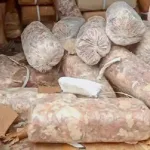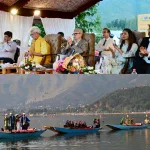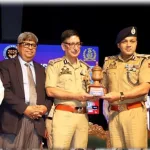JAMMU, NOV 06: Dr. Arun Kumar Mehta, the Chief Secretary of Jammu and Kashmir, conducted a comprehensive review of the ongoing projects under the Jal Jeevan Mission in the Union Territory.
The meeting, among others was attended by Shaleen Kabra, Additional Chief Secretary of the Jal Shakti Department, and the Mission Director, JJM, among other senior officials from the department.
During the session, the Chief Secretary personally inspected several Water Supply Schemes in remote areas of J&K, including Tangdhar in Kupwara, Chithi Bandey in Bandipora, and Agar Ballian in Reasi. Dr. Mehta engaged with local community members and Pani Samitis to assess the progress and quality of these projects.
Stressing the vital importance of water as a basic necessity, he urged the officials and field staff to adhere strictly to project completion deadlines, with active participation of Pani-Samitis.
The Jal Shakti Department subsequently presented a detailed report on the status of the Jal Jeevan Mission’s progress. It was revealed that 99% of the works in Kashmir division and 95% of works in Jammu division, out of a total of 6623 projects in the UT, have been allotted. By the end of December, 91% of functional household tap connections are expected to be operational.
The pace of providing household tap connections has increased significantly, from an average rate of 3200 per month to 37400 per month in the current year, with 41000 tap connections established in October.
The department announced that at the current rate of work, J&K is on track to achieve the “above 75% – High Achiever Category (4-star)” status by the end of November. At the district level, 09 districts have entered the 4-star category (more than 75%), while 07 districts have achieved the 3-star category (more than 50%) this year. Notably, Srinagar and Ganderbal districts have already reached the 100% target.
The Additional Chief Secretary of the Jal Jeevan Mission highlighted that J&K stands at the top among Union Territories and ranks 3rd overall in the country for Water Quality Monitoring and Surveillance. This achievement is credited to conducting 1.7 lakh water tests through a network of 98 water testing labs and training 32000 women to use Field Test Kits for water quality testing.
In financial terms, a total of Rs. 2100 crore have been allocated to the Jal Jeevan Mission in the current fiscal year. The government is committed to ensuring transparency and accountability by disclosing real-time progress on the JJM-IMIS portal of the Government of India, as well as details of UT fund allocations on the Janbhagidari Portal and information about works allotments under various schemes on the departmental websites of the respective Chief Engineers. Additionally, monitoring is enhanced through District-level Project Management Units (DPMUs), Consultants, and Third-Party Inspection Agencies (TPIAs).
Dr. Mehta emphasized the significance of public involvement through Pani Samitis, which provides real-time feedback and fosters a sense of public ownership of these projects. With winter approaching in the Kashmir division, he urged a swift and innovative approach to ensure project completion before the peak of winter. He called on all present to maintain adherence to timelines and complete the works within the stipulated deadlines.
The Chief Secretary also noted the upcoming visits of Prabhari Officers during the 5th Phase of the Back to Village Program as an excellent opportunity to review ongoing and completed projects under the Jal Jeevan Mission. He issued directives to make this a focus area in the upcoming edition of the Back to Village Program.





